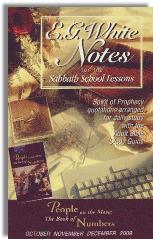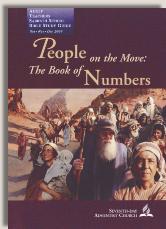|
||||||||||||||
Commentary on "People on the Move: The Book of Numbers"
The Sabbath School Quarterly lesson for the fourth quarter of 2009 is titled, People on the Move: The Book of Numbers.
The book of Numbers in the Hebrew Bible is titled, In The Wilderness. Documenting the travels of the Israelites from Mt. Sinai to the border of the Promised Land, Numbers shows God's holiness, patience and faithfulness in keeping his promises and providing for his chosen people. The English title, Numbers, comes from two censuses that are included in the book, written by Moses.
Overall, this introduction is a nice, brief introduction to the studies this quarter. The late Frank Holbrook correctly points out that Israel was not only a nation called out by God, but they were an army that was sent to conquer the inhabitants of the Promised Land and inherit the promises of God in that place. He points out that we are to learn from the various experiences of Israel in the book of Numbers. He states:
We can learn from how God organized the camp and assigned duties to the priests and the Levites. We can learn from the festivals and ordinances of the sanctuary service. We can learn from their cries about returning to Egypt, which they called “a land that floweth with milk and honey.” We can learn from Miriam’s leprosy, from the twelve spies, from Caleb’s faith, from the intercession of Moses, from Korah’s rebellion, and even from Balaam’s recalcitrant donkey.
He then quotes from 1 Corinthians 10 that we are to learn from the example of Israel, that God will not let us be tried beyond our strength, but “with the trial he will also provide a way out, so that you may be able to bear it.” (1 Cor. 10:11–13, NAB).
What are we supposed to learn?
There is only one question to ask and one item to point out before continuing with the lessons for this quarter. First, what is it that we are supposed to learn? Of course, the answer to this question will be clearer as we begin the weekly studies. Holbrook states, “In the context of the Cross and the New Covenant, the book of Numbers reveals that God has already made His choice regarding us. The only question left is, What will be our choice regarding Him?”
It is excellent that he has pointed out that the cross and the New Covenant define what God is revealing in the book of Numbers. However, in all four pages of this introductory section of the Teachers edition, (including Table of Contents and the “How To Use” section) the name of Jesus is never mentioned. This is not to say that Jesus is not mentioned in the Quarterly, but when asking the question about what one should learn, Jesus should be mentioned here. If one fails to find Jesus at the center of all of these stories in Numbers, then one is not approaching the book from a Christian standpoint. As Christians, we know the primary answer to the question of what we should learn. It is in the learning, that we will become acquainted with the details.
Is the Church waiting to enter the Promised Land?
The other item that must be addressed is exactly what it was that the children of Israel were to enter as they traveled from Mt. Sinai. Holbrook quotes Genesis 13:15-17 to explain God's promise to Abraham and his descendants: “For all the land which thou seest, to thee will I give it, and to thy seed for ever. And I will make thy seed as the dust of the earth: so that if a man can number the dust of the earth, then shall thy seed also be numbered. Arise, walk through the land in the length of it and in the breadth of it; for I will give it unto thee.” (KJV)
He then points out that we (Seventh-day Adventists) “as a people on the move, as a people seeking to reach the Promised Land, as a people called out by God, we can learn from the book of Numbers.” (Pg. 3, Teachers edition.)
This statement indicates that the Church is a people seeking to reach the Promised Land. What this view of Numbers fails to identify is the exact nature of the promise of God as interpreted by the New Testament/New Covenant. The book of Hebrews is very explicit about this promise and its meaning.
Hebrews 3:7-4:13 gives the meaning that was concealed in the book of Numbers. A common saying of Christians when comparing the Old and New Testaments is, “In the Old, concealed. In the New, revealed.” These stories in the book of Numbers are most definitely for our edification, but we cannot comprehend the ultimate reality being presented without the help of the New Testament.
The book of Hebrews points out that it was not just a “promised land” that Israel was to enter, it was salvation. It is in this passage of Hebrews that we find the real meaning of the Sabbath. Yes, Israel was commanded to keep a specific day. However, we are not telling the truth about the Sabbath if we fail to point out that the specific day for Christians, as is made clear in Hebrews, it is “Today.” Any day that a person accepts the offer of Christ, enters into God's rest.
Given the information from Hebrews, we can see that a Christian people are not “seeking to reach the Promised Land” but, having accepted Christ's atoning sacrifice, have already entered the rest that was promised to the nation of Israel. There are valuable lessons for the Christian to learn from the book of Numbers. We must not, however, confuse the entering of the Promised Land as something for which the Church is waiting. It was promised to Israel, and is an example to us today that we must accept the sacrifice of Christ in our place, and receive the promised righteousness of Christ as our possession, poured out in abundance into our hearts, by the Holy Spirit. (Romans 5:1-11.)
Summary
- The book of Numbers is the story of Israel's travels in the wilderness, and is even titled In the Wilderness in Hebrew Bibles.
- There are many things to learn from the book of Numbers, but the centrality of Christ must be identified anytime a Christian studies the Old Testament.
- The Christian Church is not “seeking to reach the Promised Land.” Upon being born again, the Christian has entered the promised land of rest, that is clearly identified in Hebrews 3:7-4:13.
- Have you entered the eternal rest that Christ promises? You may do that today (any day) by calling on him. He's available 24/7!
- The book of Numbers is an exciting book and contains numerous stories of God's work with the nation of Israel in the wilderness. We look forward to studying it with you this quarter.
Copyright 2009 BibleStudiesForAdventists.com. All rights reserved. Revised September 24, 2009. This website is published by Life Assurance Ministries, Glendale, Arizona, USA, the publisher of Proclamation! Magazine. Contact email: BibleStudiesForAdventists@gmail.com.
The Sabbath School Bible Study Guide and the corresponding E.G. White Notes are published by Pacific Press Publishing Association, which is owned and operated by the Seventh-day Adventist church. The current quarter's editions are pictured above.
Official Adventist Resources
Standard Edition Study Guide Introduction
Teacher's Edition Study Guide Introduction


